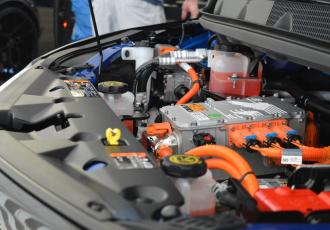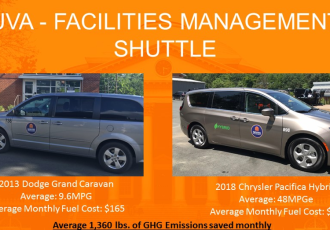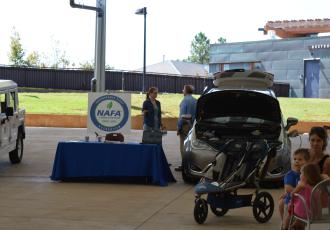Transitioning to Electric Transportation
By Cydnie Golson, Office for Sustainability Student Employee
It does not take much knowledge of current events to know that a big shift is coming in how we power our lives here in the United States. Charlottesville is becoming a hub of not only renewable energy companies, with new startups forming left and right, but also a center of other grassroots movements to make the green energy switch. Generation 180, a local nonprofit working to “inspire, empower, and equip everyday people to take action on clean energy” recently launched a statewide campaign to make access to electric cars more accessible than ever. The group hosted the Electrify Your Ride event on September 15th, 2019 at the Sprint Pavilion in Downtown Charlottesville to highlight and demonstrate electric cars currently on the market, as well as provide information about the logistics of owning one. You can sign the ‘Going Electric’ pledge yourself on Generation 180’s website to promise that the next vehicle you buy is electric.
The event gave community members the chance to try out the electric vehicles for themselves, being able to browse from a variety of makes and models. Children attending the event enjoyed sitting behind the drivers wheel (of a parked vehicle) for a change - as well as the popsicles and other treats available for sale.
Here on Grounds, UVA is following suit. The university is no stranger to transitioning to cleaner energy, with increasing solar energy in our portfolio as well as advances towards retrofitting and constructing more efficient buildings.The most recent development in this effort is UVA Facilities Management’s pilot project to switch out fleet vehicles, traditionally gas-run, to all-electric versions. This swap comes from the organization’s desire for fleet-wide emissions reductions. As UVA’s energy portfolio likewise becomes greener, primarily with the purchase of electricity from larger-scale renewable energy projects, these electric vehicles will help propel the university into a future of carbon neutrality. But data from the first round of electric vehicles demonstrates that the university stands to gain not only from emissions reductions, it can benefit from cost savings too.
One vehicle change in particular showcases this dual cost/carbon saving. UVA FM’s switch from the Dodge Grand Caravan, averaging 9.6 MPG with an average monthly fuel cost of $165 dollars, to the 2018 Chrysler Pacifica Hybrid saved an average of 1,360 lbs of GHGs monthly. The Pacifica’s much higher 48 MPGe (miles per gallon equivalent, a metric used to compare range efficiencies of gas and electrically powered vehicles) accounted for much of these savings.
Michael Duffy, a UVA Facilities Management employee, is a primary lead on this effort. He presented the Chrysler Pacifica at Generation 180’s Electrify Your Ride event.
Duffy spoke of UVA FM’s recent accreditation as a sustainable fleet by the National Association of Fleet Administrators. This success exhibits the university’s focus on being a “locus of sustainability,” as UVA’s fleet is only the sixth active university fleet to receive the accreditation. Duffy acknowledged “technology, infrastructure, and collaboration” as being the main barriers to future fleet emissions reductions. He likewise supported the idea of starting off a university’s green fleet with a smaller number of pilot vehicles before majorly switching over to electric. This process, Duffy claimed, allows for the benefit of the new vehicles to be proven before large investments are made, likewise making time for the necessary infrastructural adjustments inherent in expanded EV use.
Overall, UVA FM hopes to continue boosting the use of electric vehicles, paving the way for other universities interested in doing the same. Once large universities like UVA begin to adopt such programs, proving their environmental and financial benefits, other universities likely will take interest and follow suit. With the coupled City of Charlottesville and UVA efforts, one cannot help but think it will not be long before the transition becomes a sweeping movement across the country.



